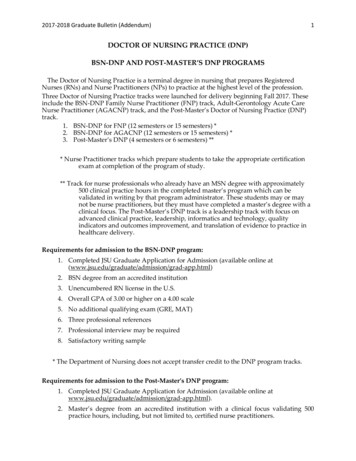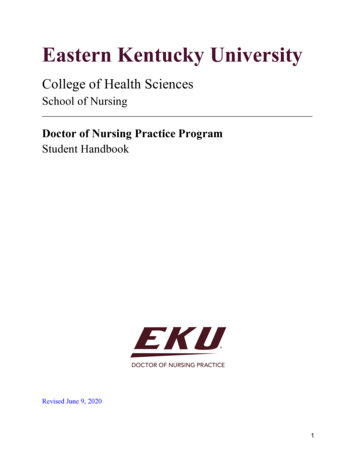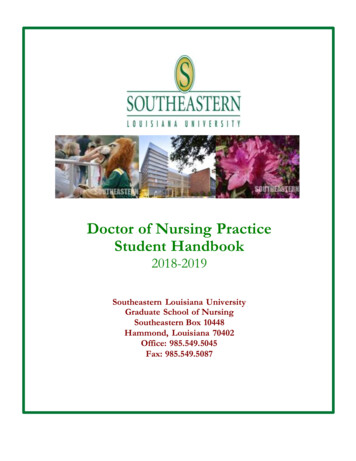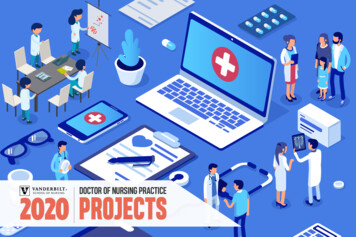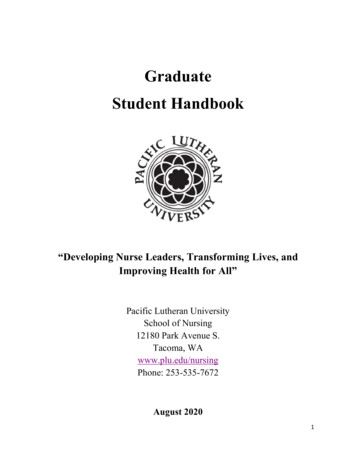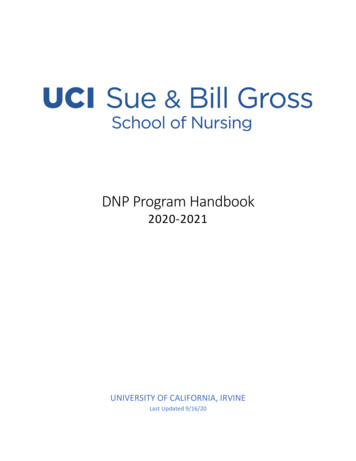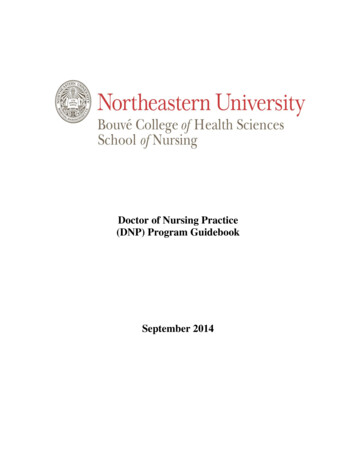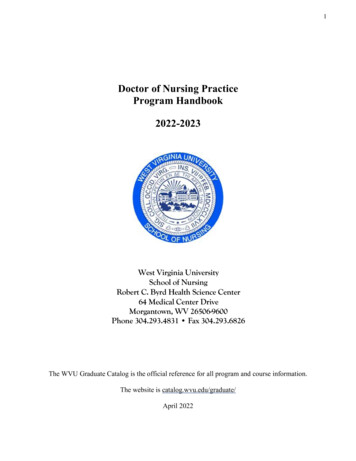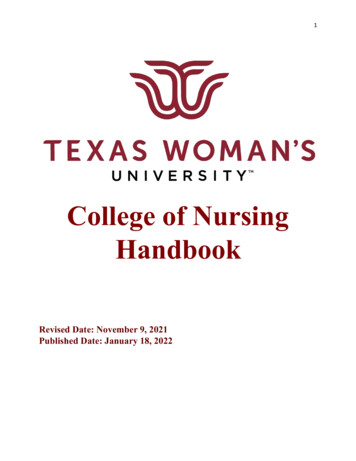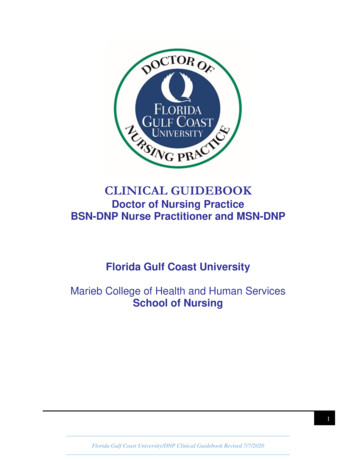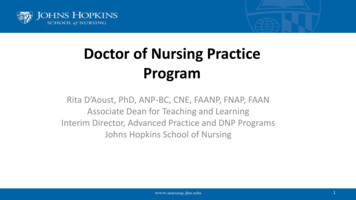
Transcription
Doctor of Nursing PracticeProgramRita D’Aoust, PhD, ANP-BC, CNE, FAANP, FNAP, FAANAssociate Dean for Teaching and LearningInterim Director, Advanced Practice and DNP ProgramsJohns Hopkins School of Nursing1
Objectives1.2.3.4.5.Examine the history and factors leading to the development of the DNPConsider benefits of the DNPIdentify pathways for the DNPExamine DNP curriculum componentsDiscuss DNP practice hours and scholarly project requirements2
History of DNP Program Development1960—Boston University opens 1st clinical doctorate1979—Case Western Reserve opens 1st ND program1999—UTHSC opens DNSc practice doctorate2001—University of Kentucky opens First DNP Program2002—AACN forms practice doctorate Task Force2003—Columbia University admits students2004—AACN members approve DNP Position Paper2009—COA Position Statement on Doctoral Education for Nurse Anesthetists requiresdoctoral education for all NA entry programs by 20222018—National Organization of Nurse Practitioner Faculties (NONPF) commitment tomove all entry-level nurse practitioner (NP) education to the DNP degree by 2025.
Factors Influencing Need for DNP Expansion of Knowledge Underlying PracticeIncreased Complexity of Patient CareMajor Concerns about Quality of Care and Patient SafetyShortages of Nursing Personnel Demanding a Higher Level of Preparationfor Leaders Who Can Design and Assess Care and Lead Shortages of Prepared Nursing Faculty, Leaders in Practice, and NurseResearchers Increasing Educational Expectations for the Preparation of other HealthProfessionals (MD, DDS, PsyD, DPT, PharmD, AudD)
Practice Doctorate Practice-focused doctoral programs prepare experts in specializedadvanced nursing practice. Builds on master’s nursing curricula Focus:– clinical practice that is innovative and evidence based– translates credible research findings for effective clinical practice– applies research processes to evaluate outcomesAmerican Association of Colleges of Nursing. (2006). The essentials of doctoral education for advanced nursing practice.Washington, DC: AACN. Available at Essentials.pdf5
The Mission“Nurses prepared at the doctoral level with a blend of clinical,organizational, economic and leadership skills are most likely to be able tocritique nursing and other clinical scientific findings and design programsof care delivery that are locally acceptable, economically feasible, andwhich significantly impact healthcare outcomes.”American Association of Colleges of Nursing. (2004). AACN position statement on the practicedoctorate in nursing. http://www. aacn. nche. edu/DNP/pdf/DNP. pdf.
WHY PURSUE A DOCTORATE ? Increase in intellectual knowledgeCareer advancementEligibility as nursing facultyIncrease in incomeEnhanced health outcomesIncreased scholarly activitiesEnhanced teachingLoomis, J.,, Willard, B., Cohen, J., (December 22, 2006). Difficult Professional Choices: Deciding Between the PhD and the DNP in Nursing. OJIN: TheOnline Journal of Issues in Nursing. Vol. 12 No. 1.National Academies of Sciences, Engineering, and Medicine. (2016). Assessing progress on the Institute of Medicine report The Future of Nursing.Rosseter, R. J. (2014). The impact of education on nursing practice. American Association of Colleges of Nursing Fact Sheet.
Practice doctorate – defined as any form of nursing intervention inadvanced nursing practice such as Advanced Practice Nursing,Leadership/Administration, or Informatics (AACN, 2004; AACN, 2015) The DNP is the terminal practice degree that prepares graduates forthe highest level of nursing practice The DNP is not an entry-level degree. Typically, licensure would occur prior to entering the DNPprogram
The Focus of the DNP Clinical decision makingResearch utilization in clinical practiceOrganizational and systems leadershipInformation systems and technologyHealth care policyClinical prevention and population health
DNP Pathway Options DNP Entry APRN DNP -direct care provider roles (NP, CRNA, CNS, CNM) Advanced Nursing Practice DNP - indirect roles ANP Post-master’s entry (gap analysis indicated) MS Nursing Education Mixed interpretation across schools in the country Dual degree options for individuals with MS Nursing education: Bridge that include advanced nursing role such as leadership,informatics to enter Post-Master’s DNP Gap analysis to maximize practice hours from 1st MS that meetsAACN Essentials of Doctoral Education for Advanced Nursing
DNP programsFocus heavily on practice that is innovative and evidence-based, reflectingthe application of credible research findings. Advanced nursing practice is broadly defined by AACN (2004) as: “anyform of nursing intervention that influences health care outcomes forindividuals or populations, including the direct care of individualpatients, management of care for individuals and populations,administration of nursing and health care organizations, and thedevelopment and implementation of health policy (p. 2).”
The Essentials of Doctoral Education for Advanced Nursing Practice (2006)*I.II.III.IV.Scientific Underpinnings for PracticeOrganizational and Systems Leadership for Quality Improvement and Systems ThinkingClinical Scholarship and Analytic Methods for Evidence-Based PracticeInformation Systems/Technology and Patient Technology for the Improvement andTransformation of Health CareV. Health Care Policy for Advocacy in Health CareVI. Interprofessional Collaboration for Improving Patient and Population OutcomesVII. Clinical Prevention and Population Health for Improving the Nation’s HealthVIII. Advanced Nursing Practice* DNP Essentials Task Force review and recommend changes12
Common DNP curriculum components Advanced Nursing Role preparation – before or during the DNP ProgramOrganizational and Systems Leadership for Quality ImprovementClinical Scholarship and Analytic Methods for Evidence-Based PracticeInformation Systems/Technology and Patient TechnologyHealth Care Policy for Advocacy in Health CareInterprofessional Collaboration for Improving Patient and Population OutcomesClinical Prevention and Population Health for Improving the Nation’s Health DNP Scholarly Project DNP Practice/Practicum Hours (1000)13
DNP ProjectAll DNP Projects should:a. Focus on a change that impacts healthcare outcomes either through direct orindirect care.b. Have a systems (micro-, meso-, or macro- level) or population/aggregate focus.c. Demonstrate implementation in the appropriate arena or area of practice.d. Include a plan for sustainability (e.g. financial, systems or political realities, notonly theoretical abstractions).e. Include an evaluation of processes and/or outcomes (formative or summative).DNP Projects should be designed so that processes and/or outcomes will beevaluated to guide practice and policy. Clinical significance is as important inguiding practice as statistical significance is in evaluating research.f. Provide a foundation for future practice scholarship.American Association of Colleges of Nursing. (2015). The Doctor of Nursing Practice: Current issues and clarifyingrecommendations. Washington, DC: AACN. Available at ite-paper, p.414
Improvement Plan Translational model that guides baselineassessment, collaboration with practice siteand team members Selection for area of improvement based onliterature and practice site preference(s) SWOT analysis Improvement strategies Evaluation measures based on standard, ROL,translational model Sustainability Dissemination
Types of Projects The AACN DNP Implementation Task Force Report (2015) has a GREAT list onthe types of DNP Projects, available at Available white-paper,– The report provides a list of at least 12 settings or areas of practice (review pages 21-23). Types of projects– Individual– Group– Longitudinal JHSON: oral/dnp/dnpprojects/dnp-projects.htmlAmerican Association of Colleges of Nursing. (2015). The Doctor of Nursing Practice: Current issues and clarifyingrecommendations. Washington, DC: AACN. Available at ite-paper,16
What is not considered a DNP Project? Integrative and Systematic Reviews:“Contrary to the DNP Essentials, the task force believes that an integrative andsystematic review alone is not considered a DNP project and does not provideopportunities for students to develop and integrate scholarship into their practice. “p.4 Portfolios:“A student’s portfolio is not considered a DNP Project, but rather a tool todocument and evaluate professional development and learning or synthesis ofstudent’s development and learning. “American Association of Colleges of Nursing. (2015). The Doctor of Nursing Practice: Current issues and clarifyingrecommendations. Washington, DC: AACN. Available at ite-paper, p.717
Practice Experiences for the DNPProvide: In-depth work/mentorship with experts in nursing, as well as otherdisciplines. Opportunities for building and assimilating knowledge for advancednursing practice at a high level of complexity. Experience in the context of advanced nursing practice within which thefinal DNP Project is completed. Opportunities for integrating and synthesizing all of the DNP Essentialsand role requirements necessary to demonstrate achievement of definedoutcomes in an area of advanced nursing practice.American Association of Colleges of Nursing. (2015). The Doctor of Nursing Practice: Current issues and clarifyingrecommendations. Washington, DC: AACN. Available at ite-paper18
Health Care SystemsClinical PracticeHealth PolicyWorkforce EducationInsurance, governmentEdwards, N. E., Coddington, J., Erler, C., & Kirkpatrick, J. (2018). The Impact of the Role of Doctor ofNursing Practice Nurses on Healthcare and Leadership. Medical Research Archives, 6(4).19
DNP Graduate Outcomes Study on DNPs’ employment, activities, and contributions 26 item survey sentto 5830 nurses in 3 organizations: AONE, AANP, AANA Sample:– 1252 respondents– Characteristics: Female 80.6%, 88% Caucasian, 49.3 Age, 3.9 yrs post DNP Instrument:– Role experiences based on DNP Essentials– Ability itemsMinnick, A. F., Kleinpell, R., & Allison, T. L. (2019). DNPs’ labor participation, activities, and reports of degreecontributions. Nursing outlook, 67(1), 89-100.20
Outcomes: DNP Employment SettingsSettingAll (n 1,225)HospitalNursing home/extended careNursing educationPublic, school or community healthOccupational/employee healthAmbulatory careInsurance or private industryGovernment agencyNursing/health professions association45.31.617.53.50.922.40.43.50.7Minnick, A. F., Kleinpell, R., & Allison, T. L., 201921
Outcomes: Impact of DNP on AbilitiesImpact on Abilities Ratings1%Not atallOrganizational changeQuality ImprovementEBPLeadershipPolicy 535.952.041.117.6Minnick, A. F., Kleinpell, R., & Allison, T. L., 201922
Recommendations Curricular rigor Faculty expertise Quality of DNP scholarly project Student encouragement and support forpublication Membership in professional organizations Leadership opportunities Education and transformation
DO I REALLY WANT TO DO THIS AGAIN?
VisionSupportPassionEssential Characteristics of rsistence
What are your career goals?Are you committed to career in practice or leadership?Are you oriented toward improving outcomes of care?Are you interested in advancing policy development?Are you interested in nursing scholarship and dissemination?
Maryland based DNP Programs Johns Hopkins University– BS-DNP: *NP and *CNS, CRNA coming– *Post-Masters DNP– Dual Degree: *DNP/MBA, DNP/PhD *Online with synchronous sessions **Some courses online and others onsite Salisbury University, Salisbury– Post-Masters– Post-Bachelor's to DNP: FNP University of Maryland– **BSN-DNP: NP, CNS, CRNA– *Post-Masters Uniformed Services University of the Health Sciences (military)– BSN-DNP: NP, CNS, CRNA27
28
References American Association of Colleges of Nursing. (2015). The Doctor of Nursing Practice:Current issues and clarifying recommendations. Washington, DC: AACN. Available white-paper American Association of Colleges of Nursing. (2006). The essentials of doctoraleducation for advanced nursing practice. Washington, DC: AACN. Available NPEssentials.pdf American Association of Colleges of Nursing. (2004). AACN position statement onthe practice doctorate in nursing. http://www. aacn. nche. edu/DNP/pdf/DNP. pdf.Available at nStatements/DNP.pdf Edwards, N. E., Coddington, J., Erler, C., & Kirkpatrick, J. (2018). The Impact of theRole of Doctor of Nursing Practice Nurses on Healthcare and Leadership. MedicalResearch Archives, 6(4). Knebel, E., & Greiner, A. C. (Eds.). (2003). Health professions education: A bridge toquality. National Academies Press.29
References Loomis, J.,, Willard, B., Cohen, J., (December 22, 2006). Difficult Professional Choices:Deciding Between the PhD and the DNP in Nursing. OJIN: The Online Journal ofIssues in Nursing. Vol. 12 No. 1. Minnick, A. F., Kleinpell, R., & Allison, T. L. (2019). DNPs’ labor participation,activities, and reports of degree contributions. Nursing outlook, 67(1), 89-100. National Academies of Sciences, Engineering, and Medicine. (2016). Assessingprogress on the Institute of Medicine report The Future of Nursing. NationalAcademies Press. National Research Council. (2005). Advancing the nation's health needs: NIHresearch training programs. National Academies Press Rosseter, R. J. (2014). The impact of education on nursing practice. AmericanAssociation of Colleges of Nursing Fact Sheet. Theresa, M., & Thornlow, D. (2018). What to consider when choosing a graduatenursing program. Nursing2018, 48(1), 11-14.30
Additional slides if needed31
Comparison of Doctoral ProgramsResearch-Focused (PhD)Practice-Focused (DNP) Prepare scholars for research andacademic careers in public or privatesectors of health care; terminal degreein research Goal: to generate new knowledge forpractice; to advance theoreticalfoundations of nursing and healthcareglobally Emphasis on scientific content andresearch methods; focus on advancingnursing science Prepared for research intensive role Intensive research experience with anoriginal research dissertation Prepare the highest level nursing practicescholars that support clinical practice:administration, policy, and academic career. Goal: to provide leadership for evidence basedpractice; to apply and translate research intopractice Emphasis on advanced nursing practice; focuson practice improvement and innovation Prepared for clinical practice leadership Practice immersion with a application-orientedscholarly project
Evidence-Based Practice (EBP): : Integrate best current evidence with clinical expertise andpatient/family preferences and values for delivery of optimal health care. What is the best approach for managing neuropathic pain in the terminally ill patient? What research has been done that could provide clinical practice guidelines?Quality Improvement (QI): Use data to monitor the outcomes of care processes and useimprovement methods to design and test changes to continuously improve the quality andsafety of health care systems. Are we doing the right things to appropriately manage patients’neuropathic pain? How do we know? How are we measuring patient outcomes?Research (R):What is it like to live with neuropathic pain?Does drug “A” work better than drug “B?”
Increasing length of Master’s Programs in Nursing Many 60 credit hours, requiring 3 years to complete Theory (didactic )and clinical credit hours increased by 72 and 36 hoursrespectively for NP programs between 1995--2000 Need for additional content in informatics, practice management, health policy,risk management, evaluation of evidence, and advanced diagnosis andmanagement
Doctor of Nursing Practice Program Rita D'Aoust, PhD, ANP-BC, CNE, FAANP, FNAP, FAAN Associate Dean for Teaching and Learning Interim Director, Advanced Practice and DNP Programs Johns Hopkins School of Nursing 1. Objectives 1. Examine the history and factors leading to the development of the DNP . Maryland based DNP Programs
